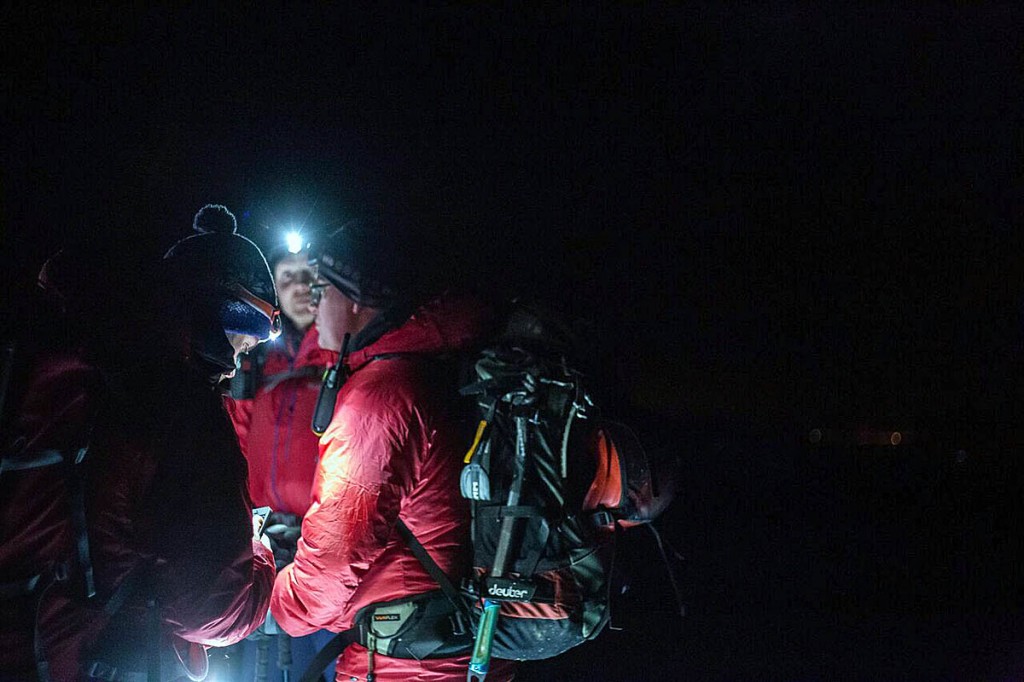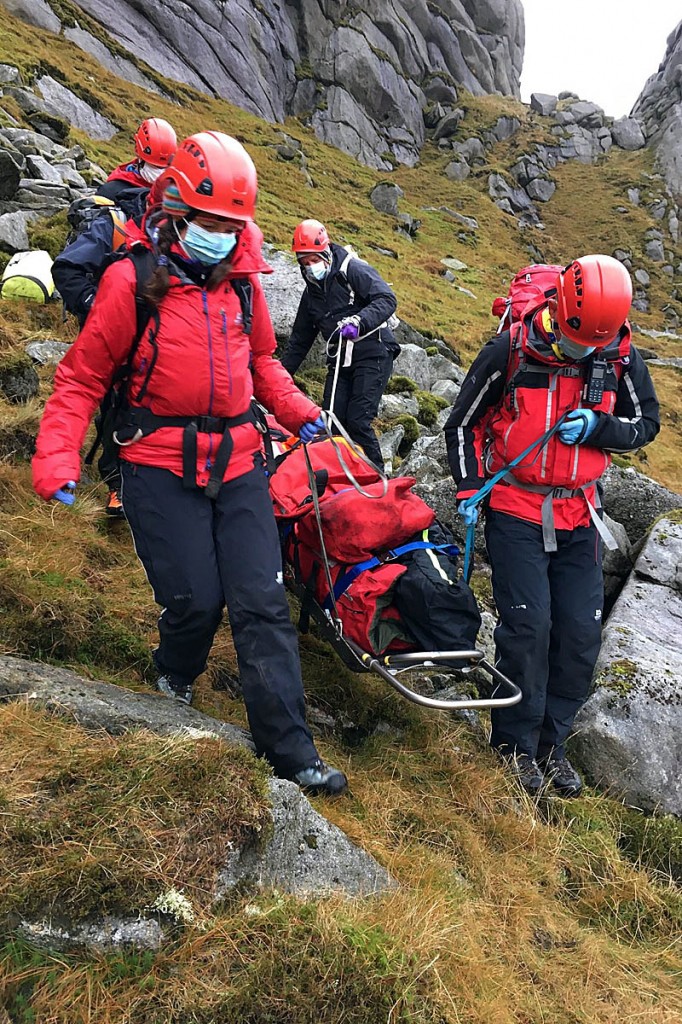Rescuers north of the border have issued advice to hillwalkers and climbers on how to call for help if they get into difficulties.
Scottish Mountain Rescue made the move as increasing numbers of people have headed into the great outdoors.
The umbrella body for 25 volunteer teams said there has been a notable growth in the numbers seen on the hills and in the countryside and, with continuing limits on overseas travel, it believes many people will carry on their new hobby throughout the winter.
It has also reminded hillwalkers on ways to stay safe on the uplands.
Scottish Mountain Rescue vice-chair Kev Mitchell said: “We are very lucky in Scotland to have a world-class volunteer mountain rescue service. Help us to help you by being prepared and knowing what to do in an emergency.
“If you are lost, in need of assistance or in an emergency, dial 999 ask for police then mountain rescue. Enjoy our incredible wild places and support our volunteer teams who will assist you any hour, any day and any weather.”
Scottish Mountain Rescue said: “You have packed your rucksack, put your boots on and headed out for an adventure into the Scottish hills but – stop – have you considered what might happen if you get into difficulty and need to call out a mountain rescue team?
“Given the increasing number of callouts that all teams across Scotland have attended recently, we need everyone to know what to do to avoid getting into difficulty and, if the worst happens, how to call for help.”
It urged hill-goers to prepare themselves for their trip by planning their day carefully, paying attention to weather conditions, equipment, clothing and supplies.
Before setting out, you should register with the 999 text service by texting the word ‘register’ to 999 and following instructions. If you don’t have a strong enough signal to make a voice call to the police, you may still be able to send a text message.
While still at home, you should download to your smartphone the free OS Locate app. This will give you a six-figure grid reference using the phone’s built-in GPS, even if you don’t have a mobile signal. SMR said, used alongside your map, this is a fast and highly accurate means of pinpointing your exact location on the map. You will need to switch on your device’s location services for the app to work.
You should leave a route card with a responsible person. Mountaineering Scotland has a downloadable example.
You should then let the person know when you are back safe.
Before heading out, you should make sure your mobile phone is fully charged and kept in your inside pocket. Carrying a map and compass and knowing how to use them is essential, and you should always be aware of what is around you and where you are.
If you do get into difficulties in the mountains and need mountain rescue’s help, you need to try to stay calm and take time to assess the situation and decide what is best to do.
Ensure you and your group are not in any immediate danger. If anyone is injured, remember ABC – airway, breathing and circulation. Insulate the injured person from the ground, add extra clothing. Place any unconscious casualties in the recovery position.
You should locate your exact position, keep warm and decide whether to descend, find shelter or remain where you are and try and conserve mobile phone battery life.
If you need to call out mountain rescue, dial 999, ask for the police, then mountain rescue. In Scotland, Police Scotland deploy all mountain rescue teams. Similar arrangements apply in the other UK nations.
The police will ask you where you are. You should try to supply a six-figure grid reference or named location or feature.
They will want to know the number and nature of injuries; how many people are in your group and what equipment you have. They will also ask for your mobile phone number and those of any others in your group.
Further safety and skills information can be found on the Mountaineering Scotland website.
Mountain rescue in Scotland is undertaken by about 1,000 skilled volunteers organised in local teams that cover the whole of the nation. There are also three police teams and one RAF team. Mountain rescue is free at the point of demand and available any time, any day, in any weather across Scotland. Funding relies heavily on donations from the public without which the service could not exist.
Scottish Mountain Rescue is itself a registered charity, and is the representative body working to support mountain rescue teams. It represents 25 of the 28 volunteer civilian teams in Scotland. Work includes national fundraising, organisation and delivery of national training courses and events, provision of insurance and supply of equipment, liaising with Police Scotland and the Scottish Government and international rescue organisations, and co-ordinating good practice.


James
08 September 2021Perhaps this needs 'much more emphasis' amid all the advice which is given out by the various mountain bodies.
"Carrying a map and compass and knowing how to use them is essential, and you should always be aware of what is around you and where you are."
Chris Goode
09 September 2021—Try: what three words.
Chris Goode
Ben Donich
10 September 2021I stopped paying attention to SMR when they told us to stay at home during lockdown.
Young man of Lochnagar
12 September 2021Ben Donich,
Please have a read again of what you've written. The clue is surely in the word 'lockdown'. I don't know specifically what supposed SMR message you're referring to, but the country experienced an unprecedented situation and certain legislation was put in place.
I find myself wondering if you are out and about in the hills/mountains now? I obviously hope it never happens, but it is conceivable that one day you might be mightily relieved to see an organisation that you seemingly take issue with, come into sight to help you in your time of need. .
Young man of Lochnagar
12 September 2021Ben Donich,
Please have a read again of what you've written. The clue is surely in the word 'lockdown'. I don't know specifically what supposed SMR message you're referring to, but the country experienced an unprecedented situation and certain legislation was put in place.
I find myself wondering if you are out and about in the hills/mountains now? I obviously hope it never happens, but it is conceivable that one day you might be mightily relieved to see an organisation that you seemingly take issue with, come into sight to help you in your time of need.
Ben Cruachan
12 September 2021Please have a read again of what you've written. The clue is surely in the word 'lockdown'. I don't know specifically what supposed SMR message you're referring to, but the country experienced an unprecedented situation and certain legislation was put in place.
I find myself wondering if you are out and about in the hills/mountains now? I obviously hope it never happens, but it is conceivable that one day you might be mightily relieved to see an organisation that you seemingly take issue with, come into sight to help you in your time of need.
Ian512
13 September 2021My understanding of Ben Donich's (Ben Cruachan?) sentence was, that it was for the Government, not Mountain Rescue, to be giving those Lockdown instructions.